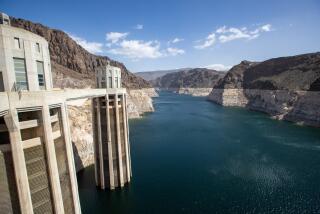Planet in Trouble
- Share via
The 1990s must be “a turnaround decade” in curbing environmental pollution around the world. The degradation of the planet was much on America’s mind last year, with farms baking in the drought and medical waste washing up on beaches. Before the concern fades to mere memory, the public must find ways to force legislators and international organizations to face the hard decisions needed to relieve the stress on the Earth.
The 1989 State of the World report by Worldwatch Institute provides an agenda and hopeful signs of grass-roots mobilization to overcome the dire risks that the experts describe. Worldwatch, a foundation-financed environmental-monitoring group, outlines four main areas for action: converting to energy systems that contribute less to global warming than do current fossil fuels, protecting imperiled forests and planting new ones, improving the world food supply and curtailing population growth.
Half the global warming now occurring is caused by concentrations of carbon dioxide, which traps heat in the lower atmosphere. Less carbon dioxide would be produced if less fossil fuel was burned. That means improving the fuel efficiency of cars, appliances and power plants, Worldwatch suggests, as well as encouraging greater use of hydro, solar, wind and geothermal power.
The Earth’s vegetation and soil store carbon, so, when forests are cleared or burned, that carbon is released, adding to the buildup of carbon dioxide and increasing global warming. Forests must be planted and protected, yet many tropical countries lack the money to do so and need the income from logging and development. Worldwatch suggests that commercial banks could reduce the debt of Third World countries in return for those countries’ agreement to improve conservation policies. The World Bank should also use its leverage to promote reforestation.
Massive increases in food production are unlikely in many areas, Worldwatch reports, although yields can be raised in the Soviet Union, Brazil, Argentina and India. But during the 1990s there may be 90 million more people to feed each year, so “future food security may lie more in the hands of family planners than farmers.”
And the family planners face many countries that may have waited too long to shift to smaller families. Now those countries may have to decide on China’s stern one-child-family goal or a decline in living standards. The experience in China and Japan since World War II shows that cutting population growth is not out of the question, but it requires education, family-planning services, incentives for small families and widespread improvements in economic conditions. In all those areas the United Nations, the World Bank and the rest of the international-development community can and must provide assistance.
Where will the world find leadership and technical expertise for the kind of global effort that lies ahead? It can and should come from the superpowers. George Kennan first suggested years ago that if--instead of concentrating on weapons--the United States and the Soviet Union worked together to preserve the environment, they would add not only to their own national security but to that of the planet as well. It is time to take the suggestion seriously.
More to Read
Sign up for Essential California
The most important California stories and recommendations in your inbox every morning.
You may occasionally receive promotional content from the Los Angeles Times.












